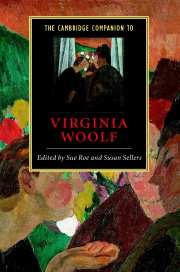Book contents
- Frontmatter
- 1 Bloomsbury
- 2 Finding a voice
- 3 Literary realism in Mrs Dalloway, To the Lighthouse, Orlando and The Waves
- 4 The novels of the 1930s and the impact of history
- 5 Virginia Woolf's essays
- 6 Virginia Woolf's diaries and letters
- 7 Virginia Woolf and the language of authorship
- 8 Virginia Woolf and modernism
- 9 The impact of post-impressionism
- 10 The socio-political vision of the novels
- 11 Woolf's feminism and feminism's Woolf
- 12 Virginia Woolf and psychoanalysis
- Guide to further reading
- Index
6 - Virginia Woolf's diaries and letters
Published online by Cambridge University Press: 28 May 2006
- Frontmatter
- 1 Bloomsbury
- 2 Finding a voice
- 3 Literary realism in Mrs Dalloway, To the Lighthouse, Orlando and The Waves
- 4 The novels of the 1930s and the impact of history
- 5 Virginia Woolf's essays
- 6 Virginia Woolf's diaries and letters
- 7 Virginia Woolf and the language of authorship
- 8 Virginia Woolf and modernism
- 9 The impact of post-impressionism
- 10 The socio-political vision of the novels
- 11 Woolf's feminism and feminism's Woolf
- 12 Virginia Woolf and psychoanalysis
- Guide to further reading
- Index
Summary
'From the chuckle 8c the babble to the rhapsody'
(D4,p.4)Virginia Woolf kept an almost daily diary throughout her life and wrote many thousands of letters. The first extant journal dates from 1897 when Woolf was fourteen and the diaries continue, with interruptions, until her suicide in 1941. Her earliest surviving letter was written in 1888, and she maintained a regular correspondence right up to her death, sometimes writing six letters a day. The diaries and letters are now published in twelve volumes and form a substantial part of her œuvre. They have been hailed as works of genius. Quentin Bell, in his introduction to the mature diaries, describes them as a 'masterpiece', and reviewers of both the diaries and the letters have been equally laudatory. Yet, despite the accolades, the tendency has been to scour the diaries and letters for the insights they afford into Woolf's writing, or - in the wake of the seemingly endless fascination with Bloomsbury - into Woolf herself. They are rarely read in their own right.
Considering the diaries and letters as distinct and intrinsically worthwhile works of art raises interesting questions. What is their relationship to Woolf's other writing - her fiction and criticism? How does one read a personal diary, or a letter intended for its addressee? What reading strategies might be appropriate for such material? Can Woolf's views expressed in her diaries be taken in evidence when reading her fiction? Does the fact that she signs her letters mean that they are true? In this chapter, I explore these and other questions, and suggest that postmodern theory offers a rewarding frame from which to review the genres. In particular, I argue that recent French feminist accounts of human subjectivity and writing provide dynamic routes into the diaries and letters, and intimate their accomplishment of the new form for which Woolf was searching throughout her career.
- Type
- Chapter
- Information
- The Cambridge Companion to Virginia Woolf , pp. 109 - 126Publisher: Cambridge University PressPrint publication year: 2000
- 2
- Cited by



